By Dr Julie Monroe, NUBS Research Fellow
10 Oct 2022
I joined the ECR Writing Group this year and I’ve attended four times so far. The group was recommended by a NUBS reviewer when I was applying for a NUBS fellowship. I enjoy the structure and personally Fridays seem an ideal day to end the working week on a writing-focused high. What has been interesting has been the breadth of projects that colleagues bring. I thought people would be mainly writing journal articles, but you can work on anything including reading, slides for a presentation, anything where you need a space to think. One of the big pluses has been the conversations with colleagues I hadn’t met before (and might never have met). We are lucky to enjoy excellent facilities (the group meets in the board room at FDC on a Friday in term time). Having said that, because of the Teams group, people often organise outside of the Friday structure, for example, meeting virtually through the week and there are also writing retreats. The atmosphere is supportive!
Author Archives: Josephine
The wonderful world of writing groups

By Dr Emily Yarrow, Senior Lecturer in Management and Organisations, NUBS
Writing is an integral part of academic life, but unfortunately something that is often the first thing to be squeezed out of one’s time when various other tasks take over, particularly during the teaching semester. Finding the time and [intellectual] space to write can oft be challenging. Time for writing is something that we need to protect, and proactively plan into our schedules.
As a new member of staff, having joined NUBS in September 2021, I was delighted to see a writing group and was excited to join. Meeting on Fridays, the group has not only provided me with a set time and space to write, but has also been a good opportunity to meet colleagues, make friends, benefit from ‘positive peer pressure’ which I find helpful in encouraging me to write, as well as bringing a much-needed social aspect to writing, particularly in the scheduled breaks.
We follow the pomodoro method, whereby we write in 25 minute chunks, followed by a five minute break, in cycles of about four sessions and then we have a longer break. I have been using the pomodoro method for the last ten years, not only for my academic writing but also for other work and personal tasks, and find it to be very effective. Whilst I often find myself proselytising to my own students about the power of breaking down tasks such as a dissertation or essay into smaller, more manageable chunks, the pomodoro method encourages me to do this in my own work, to practice what I preach, and it really is an approach which has revolutionised how I approach a range of tasks, including writing. I never cease to be amazed at how much one can do in what is a relatively short timeframe when distractions are minimised.
For writing in particular, I find the method helpful to get me started on a piece, or to keep me motivated for tasks that I enjoy less such as editing or working on revisions. Knowing you only have to work on something that may feel overwhelming for 25 minutes before a brief break, can be both motivating and feel more manageable. Despite the alarm for the pomodoro timer regularly giving me a fright and making me jump in my chair, there is always a sense of accomplishment at the end of each pomodoro, however small and sharing that in the group is also helpful.
For me, the benefits of the writing group are very clear in terms of writing output, but also in terms of discussing ideas, sharing how to tackle something that I may be unsure about. Helping, co-motivating and supporting each other is something that I value hugely, and which is particularly important in a profession where we spend much time writing alone, not least due to the pandemic. The writing group has been, and is, a welcome tonic; a chance to really focus on my research and writing, keep everything ticking over and make continued progress.
Lastly, I wanted to talk about collegial encouragement and celebrating success.In the writing group, we talk about what we’re working on and share our successes, there is such a genuinely supportive vibe, something which is not only motivating, but important. It brings me joy to share in others success and be a part of that journey with them, and that is the wonder of the writing group in a nutshell.
Preparing for the first NUBS PhD Thesis Writing Bootcamp
I was invited to give a presentation about organising the Writing Club at the NUBS Digital Research Festival in September. In the presentation I explained our motivations as colleagues and how we got organised, as well as reporting some of our outputs so that we could ensure institutional support. The presentation finished with an encouragement for others to get involved, especially as some of our valued members have moved to other jobs since we organised our ‘Writing Commons’.
People said it was an encouraging and inspiring* story of Outstanding Research Citizenship. During the Q&A, one of the PhDs in Entrepreneurship asked about joining the ECR Writing Club. I said that I would be happy to assist in helping them to organise their own PhD-focused group as that would probably be more helpful.
A couple of emails later, it was agreed with the PGR Director that I would run a Thesis Writing Bootcamp on a Saturday in early December.
We advertised the PhD Thesis Writing Bootcamp using this poster (below) which was emailed to all NUBS PhDs. The call to action required applicants to complete a webform with a specific writing project (e.g. thesis chapter, conference paper, journal article) and a detailed plan for the Bootcamp, as well information about their current writing practice. A snapshot of some responses are shown below.
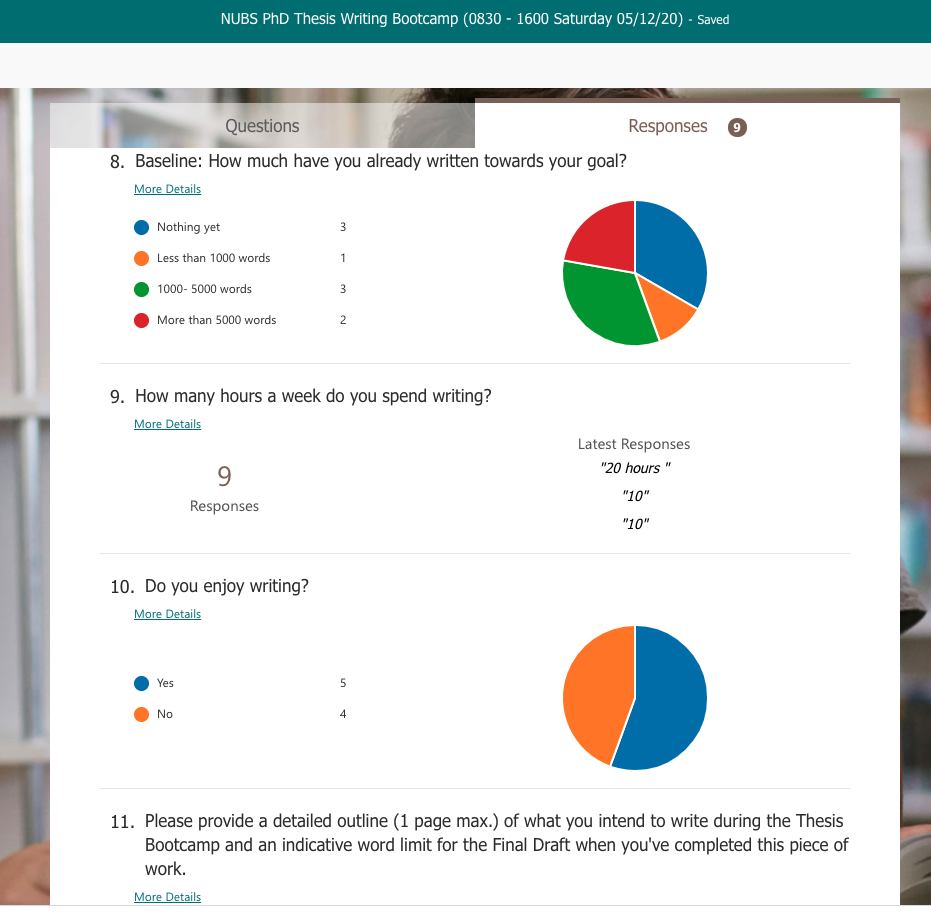
All 9 applicants were invited to join the bootcamp with detailed instructions for how to mentally and physically prepare (see link).
*yes, we can now use ‘Award Winning’ to market our activities 😉
Post-Bootcamp Results
During the 1-day Thesis Bootcamp we completed 12 Pomodoros — or 5 hours of focused writing. Quite an accomplishment.
As the facilitator, I was ‘in the trenches’ with the other Bootcampers. My writing project involved progressing a paper for a special issue that I’d been mentally planning for many months (egads, it’s nearly a year!). I ‘arrived’ at the Virtual session armed with: notes about the method and the results of our analysis from my co-author, the target word count, and a blank page. By the end of the session I’d drafted half of the paper.
We had 9 PhD students enrolled and two academic staff (1 facilitating, 1 PGR Director seeing what it was about). We had 2 last-minute withdrawals and 3 who left before the session finished.
Feedback was very positive (4.75/5 stars)!
- This Writing Bootcamp was very successful. I was able to work on my analytical discussion for my second chapter, and successfully completely 1200 words.
- I wanted to thank you again for organising the bootcamp. It was highly beneficial and your calm approach was really appreciated. I would be very interested to attend another bootcamp.
- I find that Pomodoro technique was very useful. I will definitely try to incorporate this going forward. I also enjoyed writing together and plan to do this more often with friends.
- The commitment! I didn’t necessarily follow the breaks religiously, sometimes I carried on working during a break, and sometimes I extended the break by few minutes. Ultimately it depends on what I am doing, and I don’t want to break the work at the wrong point. But the monitoring, the writing together and commitment all made it work.
- Pomodoro – to have regular breaks mentally and physically to get up and move. The controlling purpose – to bring focus and clarity to what I am working on/thought process.
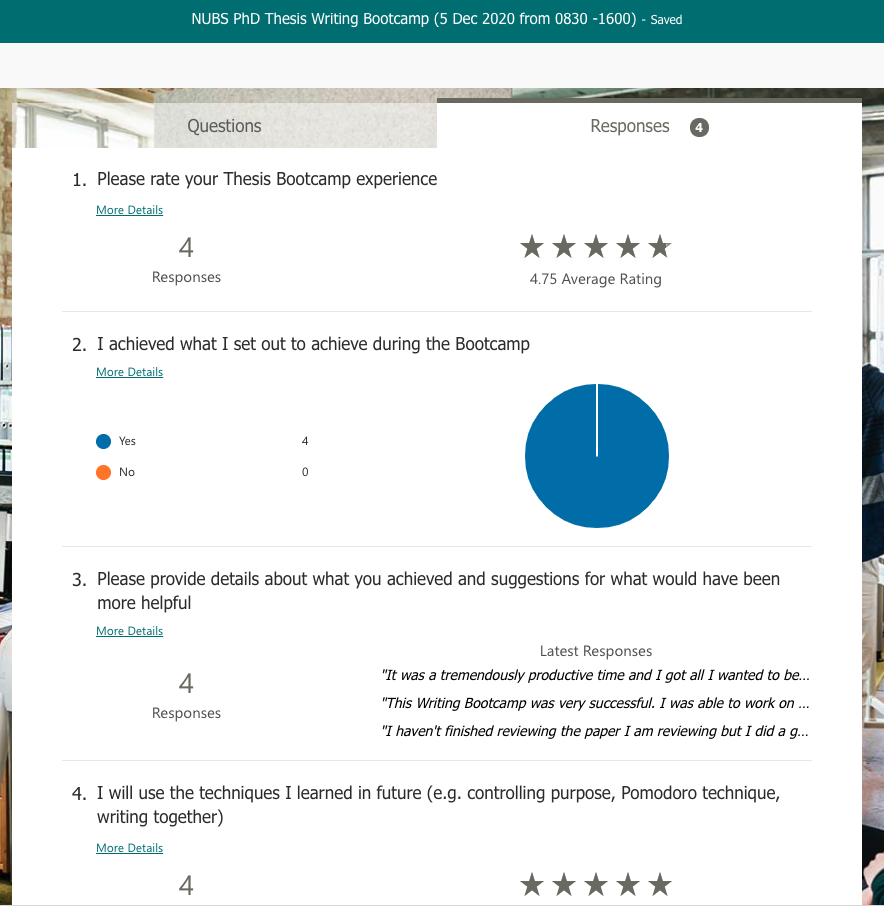
Suggested improvements, were to keep with the longer lunch (45-minutes as planned instead of shortening it to 30) and to ensure the Zoom host (me) was vigilant about muting attendees who left their mics on.
Writing Chunks
Link

This morning I had a Skype call with a US-based co-author. She was spending a week writing on an island near Goteborg, Sweden with another co-author. She called it ‘bliss’.
We’re so lucky to have Newcastle University’s H&SS faculty support our own ECR Writing Retreat. As it is soon upon us, I wanted to help set the scene for a great session.
Here is a link to the always enlightening Pat Thomson’s blog ‘patter’ on academic writing. She explains that she finds it helpful to aim to write in ‘chunks’ rather than targeting a number of words or pages.
How many ‘chunks’ away are you from finishing that section? Completing a draft? How many ‘chunks’ will you write today? This week?
At the beginning and end of each day of the retreat, we discuss goals and progress. How many writing chunks further can we get?
Plans are afoot to resume the ECR Writing Club’s regular sessions once the marking period ends — we can’t wait to get back into the writing groove — chunks at a time!
Photo by mauro paillex on Unsplash
ECR Residential Writing Retreat 2019!!
Seven months on…
Quote

This invited blog post is courtesy of one of our regular writing club participants (SJA):
——————————————-
The ECR writing club is now seven months old! Whilst I’ve not made it to every single writing session, since its official inception at the start of the academic year, I now make it my mission to be at writing club each week! Here are four reasons why…
First, the clearing of the diary (as teaching allows) for one day a week has been an important shift in focus for me. Rather than waiting for writing time to magically present itself (and passively wondering why it rarely does) or dipping in and out of research between commitments, this forces me to set aside quality writing time and crucially to make more productive use of that time.
Second, a day away from the office, particularly when we meet in a different building – even if only metres away from NUBS – creates an important physical distance from the (multiple!) demands of other aspects of our roles. This clears space for more focused thinking about research.
Third, for someone who has struggled to set achievable research goals, the practice of sharing plans for the day and reviewing these at the end is helping me to be (more) realistic in setting and meeting short-term targets.

Finally, the prospect of catching up with lovely peers during the (well-deserved) 5 minute, 15 minute and lunchtime breaks – and of course the ritual of heading to ‘Bait’ for a gourmet sandwich at lunchtime – is a helpful writing incentive if not THE main motivational highlight! This aspect has not gone unnoticed from our friends and family… to the extent that partners of several writing group members have affectionately dubbed the group: Eating Club! We know they’re only jealous… and clearly they have good reason to be! (Special thanks again to the wonderful Fiona Whitehurst and June Landless for the tea and coffee supplies for the Flavia machine which keep us well watered and happily tapping away on our laptops throughout the day!)

Despite the slight room temperature issues we have experienced on occasion (which helped us to feel at home (!) but thankfully seem to be sorted) and the inevitability of arriving back to pressing emails, writing club has provided me with a focused, supportive and motivational writing environment, impetus to move forward with research each week and a great excuse for a gourmet jalapeno tuna melt!
News: Residential Writing Retreat
For Semester 2 we changed the Writing Club meetings to Monday to accommodate our teaching schedules and finding a way of maintaining our practice has been a real benefit.
We were also successful in our bid for MOS Strategic Innovation Fund enabling us to organise a Residential Writing Retreat in the Northumberland countryside for Early Career Academics in early July.
Here is an excerpt from our bid explaining the value of Writing Retreats.
—–
Following numerous positive experiences of the NUBS Early Career Researcher Writing Club (co-founded by three MOS ECR members), we believe a useful addition to our professional development and fostering the research culture would be to run a residential writing retreat that follows the same guidelines as the Writing Club. The main purpose of the club is to advance the research output, which is one of the core strategic goals at NUBS, as the institution is committed to research-led practices.
The ECR Writing Club provides a supportive community and a structured writing practice. Our routine includes sharing our writing goals for the day and follows the Pomodoro Technique to maintain focus and motivation. As the club is of an inclusive character, the invitation to take part is extended to a wider group of NUBS colleagues seeking a quiet and dedicated time and space to progress academic writing projects.
Increasingly the practice of offering academic writing retreats is shown to provide personal, professional and organisational benefits.
The five key elements of writing retreats conducive to increasing publication output were protected time and space; community of practice; development of academic writing competence; intra-personal benefits and organisational investment. Participants involved achieved greater publication outputs, particularly when provided ongoing support (Kornhaber et al. 2016).
Institutions encouraging writing retreats in practice include Bath, Sheffield and Warwick Universities, to provide supportive communities of practice free from other commitments and distractions. Variants include adopting a neo-liberal approach to quantify productivity and performance against projected outputs (https://theresearchwhisperer.wordpress.com). Our ECR Writing Club is committed to setting goals at the beginning of the writing sessions and then reflecting at the end of the day how these goals have been achieved.
This will be valuable to MOS and NUBS colleagues in terms of advancing the existing research culture and support the development of published work, tying with the research aims of the School and research communities to produce high-quality research output, aimed at 3* and 4* ABS publications. Finally, such activities contribute to stronger social cohesiveness within the school. Positive working culture is an important institutional objective for NUBS and such activities directly contribute to it.
References
Kornhaber et al. (2016) The benefits and challenges of academic writing retreats: an integrative review. Journal of Higher Education Research and Development. 25 (6): 1210-1227. https://doi.org/10.1080/07294360.2016.1144572
SFDs and Procrastination — Improving your writing practice — Book your places
I just read this *mid-procrastination* and wanted to share it before closing the browser tab, stopping the editing-while-writing, and resuming the crafting of my own SFD.
If you’d like to know what a SFD is, and when and why it’s useful, click below:
https://www.timeshighereducation.com/blog/phd-thesis-writing-it-and-art-procrastination
http://engl210-picetti.wikispaces.umb.edu/file/view/Lamott_Bird+by+Bird.pdf
How are you finding your writing practice developing? Do you work better anonymously or in the trenches with fellow scribes?
If you’re not sure, our next and final writing club session of the Four Fridays Pilot is taking place tomorrow. We encourage you to give it a try.
Two further dates are now confirmed for Friday 15th and 29th September.
Please book your space using the doodle poll:
https://beta.doodle.com/poll/fbckx7dwg6mbqg4r
Finding a working rhythm
We are midway through the ECR Writing Club Pilot and members are finding it worthwhile to carve out a dedicated space and time for academic writing every week among like-minded colleagues.
To this end, we have agreed to try and continue the collaborative sessions every Friday throughout Semester 1 and aim to develop further ideas to encourage a supportive research environment.
If you would like to get involved, please reserve a place using the doodle poll (see previous posts for the link).
What’s the experience like?
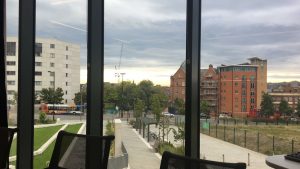
The view from the ECR Writing Club windows
The group aims to do 7 pomodoro sessions interspersed by 5 minute breaks usually with shared snacks. We take a longer break for lunch.
- We begin at 9am by discussing our writing aims for the day, and start the first silent pomodoro session.
- Week 1, we started using 25 minute pomodoros and changed gears to try 45 minute sessions post-lunch.
- Week 2 we experimented again (longer 45 minute sessions in the morning, and 25 minute focused bursts in the afternoon), which seemed to work well, depending on the task you are trying to achieve.
- Around 4pm we finish by discussing our day’s progress, reflecting on what worked and what we could improve.
***Finally, we appreciate having access to the coffee and tea machine during the short breaks and would like to thank Fiona Whitehurst and June at Newcastle University Business School and the Newcastle University Organisational Development Team at the Core for their tokens of support.
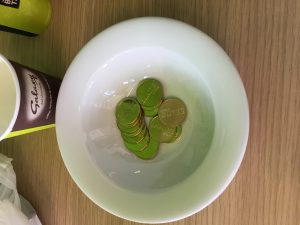
Thanks to the Organisational Development Team for the literal tokens of support
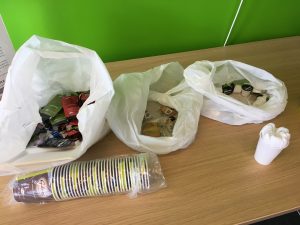
Academic sustenance – coffee and tea supplied by Newcastle University Business School

